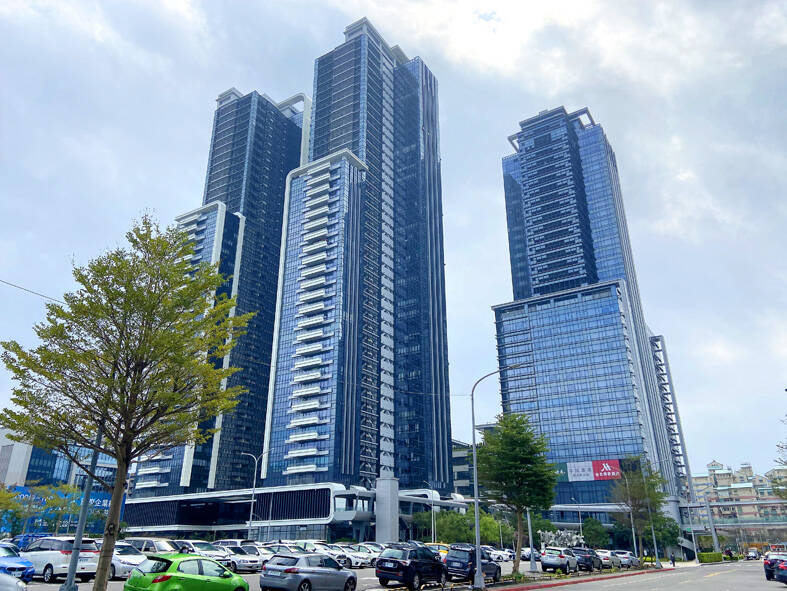Property transactions in the six special municipalities last quarter plunged 24.1 percent from a year earlier to 49,290 units, dragged by weak sentiment, although buying interest last month showed a noticeable improvement.
It was the lowest volume since 2018 as a series of interest rate hikes and unfavorable policy measures cast a shadow on the market.
“The ban on transfers of presale house purchase agreements and monetary tightening sidelined prospective buyers looking for bargains,” Great Home Realty Co (大家房屋) head researcher Mandy Lang (郎美囡) said on Thursday.

Photo: Hsu Yi-ping, Taipei Times
PRICING INFLEXIBILITY
However, expectations that prices would fall have yet to materialize, as sellers held firm, buoyed by a government pledge that the upcoming ban would not affect existing deals.
Weighed by economic uncertainty and pricing concerns, transaction during the January-to-March period fell 28 percent to 5,677 units in Taipei, slumped 25 percent to 12,521 units in New Taipei City and dropped 27.8 percent to 8,190 units in Taoyuan, government data showed.
Deals declined 23 percent to 9,870 units in Taichung, decreased 19 percent to 4,932 units in Tainan and fell 22 percent to 8,025 units in Kaohsiung.
Sellers would rather hold onto their properties than accept what they deem as unreasonable or humiliating offers, H&B Realty Co (住商不動產) research head Jessica Hsu (徐佳馨) said.
Pricing inflexibility accounted in part for the absence of panic selling — unlike in 2016 before the introduction of combined property taxes that drove investors to cut prices and exit the market, Hsu said.
MARCH PICKUP
The gloomy sentiment eased somewhat last month, with transactions in the six special municipalities standing at 20,860 units, down 17.4 percent year-on-year, but up 31.9 percent from February, Sinyi Realty Inc (信義房屋) said.
Pent-up real demand underpinned the pickup after price corrections failed to materialize, Sinyi research manager Tseng Ching-der (曾進德) said.
More working days and the completion of new residential projects also lent support to last month’s data, Tseng said.
Developers wrapped up construction of presale housing complexes in Taoyuan’s Gueishan District (龜山) and Tainan’s Gueiren District (歸仁), Taiwan Realty Co (台灣房屋) said.
Transactions are likely to stay soft in line with an economic slowdown, but the room for price corrections is limited given higher building material costs, the broker said.

UNCERTAINTY: Innolux activated a stringent supply chain management mechanism, as it did during the COVID-19 pandemic, to ensure optimal inventory levels for customers Flat-panel display makers AUO Corp (友達) and Innolux Corp (群創) yesterday said that about 12 to 20 percent of their display business is at risk of potential US tariffs and that they would relocate production or shipment destinations to mitigate the levies’ effects. US tariffs would have a direct impact of US$200 million on AUO’s revenue, company chairman Paul Peng (彭雙浪) told reporters on the sidelines of the Touch Taiwan trade show in Taipei yesterday. That would make up about 12 percent of the company’s overall revenue. To cope with the tariff uncertainty, AUO plans to allocate its production to manufacturing facilities in

TAKING STOCK: A Taiwanese cookware firm in Vietnam urged customers to assess inventory or place orders early so shipments can reach the US while tariffs are paused Taiwanese businesses in Vietnam are exploring alternatives after the White House imposed a 46 percent import duty on Vietnamese goods, following US President Donald Trump’s announcement of “reciprocal” tariffs on the US’ trading partners. Lo Shih-liang (羅世良), chairman of Brico Industry Co (裕茂工業), a Taiwanese company that manufactures cast iron cookware and stove components in Vietnam, said that more than 40 percent of his business was tied to the US market, describing the constant US policy shifts as an emotional roller coaster. “I work during the day and stay up all night watching the news. I’ve been following US news until 3am

COLLABORATION: Given Taiwan’s key position in global supply chains, the US firm is discussing strategies with local partners and clients to deal with global uncertainties Advanced Micro Devices Inc (AMD) yesterday said it is meeting with local ecosystem partners, including Taiwan Semiconductor Manufacturing Co (TSMC, 台積電), to discuss strategies, including long-term manufacturing, to navigate uncertainties such as US tariffs, as Taiwan occupies an important position in global supply chains. AMD chief executive officer Lisa Su (蘇姿丰) told reporters that Taiwan is an important part of the chip designer’s ecosystem and she is discussing with partners and customers in Taiwan to forge strong collaborations on different areas during this critical period. AMD has just become the first artificial-intelligence (AI) server chip customer of TSMC to utilize its advanced

Six years ago, LVMH’s billionaire CEO Bernard Arnault and US President Donald Trump cut the blue ribbon on a factory in rural Texas that would make designer handbags for Louis Vuitton, one of the world’s best-known luxury brands. However, since the high-profile opening, the factory has faced a host of problems limiting production, 11 former Louis Vuitton employees said. The site has consistently ranked among the worst-performing for Louis Vuitton globally, “significantly” underperforming other facilities, said three former Louis Vuitton workers and a senior industry source, who cited internal rankings shared with staff. The plant’s problems — which have not